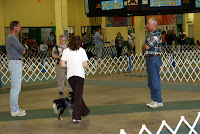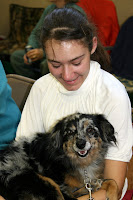Four days ago I learned about, opted into and wrote a review of the new Google Social Search ability. Since I'm a typical egotist, I was chagrined to see I wasn't showing up in my own social circle. While most things "Internet" get better with age - as software, search engines and social media roll out, refine and listen to their audiences - I'm more than a bit disappointed that things are even worse for my social searches now than they were earlier in the week.
Google, did Matt Cutts tattle on me, say I was dissatisfied with your shiny new service and now you're punishing me? No...that's not the way the universe works. Still, I find maybe I should've kept my pie-hole corked and not mentioned my disappointment, since now my social circle is eerily absent from my SERPs in social searches. As far as I know and can see, I'm still opted into the experiment, because it does work a little bit. Sometimes.
But let's take a look at how things have changed since Monday.
Monday's search for "SEO" revealed my social circle as my husband and Portland friend in the main SERP; when I delved into the 'Social' tab of my 'Options' I got a few more results from my fellow Twitterers, blog buddies, etc.
Yesterday and today? The results are MUCH different:
 Obviously this result is right from my Google Reader subscription. Odd, because that result was absent on Monday. Let's look a bit further - utilizing the 'More Options' screen, I choose 'Social'...the results are scarce, to say the least.
Obviously this result is right from my Google Reader subscription. Odd, because that result was absent on Monday. Let's look a bit further - utilizing the 'More Options' screen, I choose 'Social'...the results are scarce, to say the least. Ok. So maybe "SEO" is too...I don't know, competitive. (Competitive between my social buddies?) So I'll try something I KNOW multiple friends on Twitter, Facebook, and blogs are mentioning: Halloween. After all, we're only 1 day shy of All Hallows' Eve.
Ok. So maybe "SEO" is too...I don't know, competitive. (Competitive between my social buddies?) So I'll try something I KNOW multiple friends on Twitter, Facebook, and blogs are mentioning: Halloween. After all, we're only 1 day shy of All Hallows' Eve.It seems none of my online acquaintances are talking about Halloween. Or costumes. But wait, they ARE - I've read several Tweets about those very topics today. So where's my circle, Google? Nothing. Nada. Zip. Now, not only am I not showing up, my friends aren't, either. Boooooooooooooooo. And not in the Halloween, fun, scared-you type of way.
Since this has all changed so drastically for me, I decided to read more on social search - ended up at the Matt Cutts video explaining it within the Googleblog post. In it, he (Matt) states there are a few ways Google taps into a person's social circle: Google profile, Friendfeed and Google Reader.
Well, I do have a Reader account - browse through that every morning. I also have a Google profile. While I don't use Friendfeed, two out of three should garner me SOME results I can live with in regards to social search. But, alas, no. Get thee to thy room, O naughty negative reviewer of Google services.










